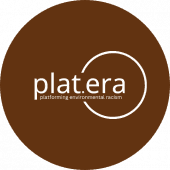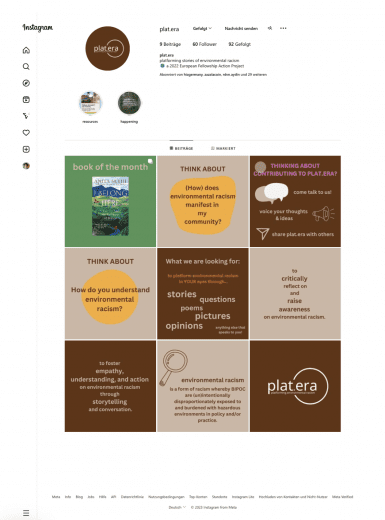Article
Rosi-Selam Reusing and David Schupp have been working together based on a shared passion for environmental, racial, ethnic, and social justice to create “plat.era” – a platform dedicated to spotlighting environmental racism through storytelling, raising awareness, and focusing on those affected. Though the project primarily occurred in Germany, Rosi and David have been working out of London, England and Bochum, Germany fairly equitably. Currently the project platform is an Instagram page where personal narratives are shared and environmental racial justice is advocated for, and in the future they also plan to create a website which will facilitate a similar experience. The project is mostly completed, however they are still actively working on engaging more community members and expanding their network to include the plat.era website.
Inspiration for plat.era
This project was created out of the shared passion Rosi and David both have for intersectional environmental racial justice and bringing awareness to the dark fact that racially and ethnically discriminated against communities face the brunt of environmental devastation and climate change. The plat.era project addresses the problem of environmental racism and the relative lack of awareness on the matter in comparison to how many people are affected by it and the expansiveness of the issue. Rosi and David desired to mobilize the power of storytelling in order to bring to light environmental racism and make the phenomenon more visible, easily accessible, and engaging to a broader audience.
Specifically, Rosi chose the topic of environmental racism because she wanted to dedicate more energy towards it, as it is an issue that she has come across in her studies and through having a personal interest in environmental justice. She has been inspired by the changes that environmental justice advocates have already made, yet is interested in the fact that there is still so much to be done to platform these stories and at the same time, the negative realities of environmental racism. Rosi sees storytelling as a powerful and connective medium, therefore she desired to tackle this issue from such an interpersonal angle.
Furthermore, David has always been passionate about addressing racism, and this project provided an opportunity to delve into that further. In the initial stages of the Fellowship, David was contemplating working on a project with another person, and he found that in a conversation with Rosi-Selam the ideas they exchanged were thoughtful and stirred in him an even greater urgency to understand and address this issue more thoroughly. Whilst David already had some experience in this domain, he was eager to approach this issue from a fresh perspective, from the ground up. This approach, he believes, would not only expand his understanding but would also help in reaching a broader audience, thus raising greater awareness about the intersectionality of environment and racism.
Developing the Project
To create plat.era, Rosi and David organized their project development process into three primary phases: foundation, execution, and evaluation.
For the foundation, this phase was mostly focused on brainstorming, ideation, and structuring their project. They set up a Notion page to streamline their thoughts and organize their plans. They spent a lot of time devising their vision and mission statements through a project action plan, which not only defined the core of their project, but also served as a guiding force in all their subsequent steps. Additionally, they reached out to various individuals in their network, including scholars, professionals, and community members. They connected with them through different avenues such as HIA networking events. In their conversations with these professionals, they gathered information to further their ideas and received valuable feedback.
Their execution phase involves bringing their ideas to life. This is when they launched their Instagram, @plat.era, and started to create their website. This is also when they developed their visual identity, including the logo and font which represents their project.

Sharing resources and engaging with their community was a critical part of this phase. As, seeking opinions and learning from others’ approaches further enriched their project immensely. A major part of the execution phase was conducting interviews with experts and individuals affected by environmental racism, as sharing interpersonal narratives is a main focus of plat.era. As intended, stories, experiences, and insights of those affected will be shared on their Instagram and website.
Rosi and David reveal that they are currently in the evaluation phase, which involves a critical reflection on their project’s progress and impact. A key part of this stage is to think about their future steps, as they aim to move into a sharing phase where they plan to reach a wider audience and build a more extensive community around their platform.
Logistics and Resources
Their project necessitated a combination of both human and technical resources. On the human resources side, the primary requirement was engaging with people who are knowledgeable about their chosen topic. They sought out individuals working in the field of environmental racism, activists, and others who are both well-informed and passionate about this issue. These experts served dual roles in their project; not only did they help Rosi and David to refine and reflect upon their project idea, but they also formed the initial set of people they plan to interview. Their insights are invaluable to plat.era’s success, providing direction and depth. They reached out to them via various professional platforms and events and are currently still in the process of planning these interviews.
On the technical side, they needed to establish an online presence to disseminate their findings and facilitate communication. To this end, they set up a domain, an email address, of course, the @plat.era Instagram account, and a LinkedIn page. There were costs associated with these, such as domain registration and web hosting, but Rosi and David managed these expenditures themselves.
In essence, their resources were a blend of human expertise and technical infrastructure, acquired through personal investment and leveraging professional networks. They view these as the essential building blocks to our project and its potential impact.
The Reality of Challenge
In any large-scale project such as this one, there are naturally going to be obstacles to overcome. One of the initial challenges they faced was an absence of clarity in their idea. Their initial concept was broad and nebulous, making it hard for them to begin the actual creating phrase. They found themselves engrossed in only discussing and thinking about the project, which, while essential to some extent, delayed the actual fundamental start. In retrospect, they realized that starting the actual work—jumping right into the project—would have given us more practical insights and helped us refine our idea faster.
“The journey of our project was marked by some challenges and revelations that shaped our perspective and approach.” – David
With that being said, they advise anyone embarking on a similar project to not to get too caught up in the planning phase. Rosi and David advocate not being afraid to just dive right in, even if the waters seem murky. Starting small, for instance with one interview published on an Instagram account, can provide useful momentum.
They also faced a specific challenge related to funding. While they were capable of handling the costs associated with establishing their online presence, they struggled when they couldn’t provide compensation for contributions. As the project was self-funded, the scope had to be adjusted to what they could manage without external funding.
Their advice, in terms of funding challenges, would be to have a clear understanding of what you want to achieve and realistically assess, if and how, it can be done within your budget. All in all, they learned that starting small, maintaining focus on the vision, and carefully managing resources are all key strategies for undertaking a project like theirs. We also discovered the importance of flexibility and adaptability in the face of surprises and challenges.
“I found the time and expectation management the most challenging as a full-time student and concurrently having big ideas and ambitions for where we wanted the project to go. I was surprised by how difficult it would be to undertake the project and more positively, by the vast variety of directions our brainstorming took us. I would advise someone trying to undertake a similar project to be more specific about what the project is about and what it is to achieve. Whilst I thought our expansive and open ‘definition’ of storytelling would be an asset, at times it felt like a block in that people (and myself at times!) felt unclear about our aims and vision.” – Rosi
What Makes it All Worth it
Overall, this project has greatly resonated with both Rosi and David personally, and they hope that the experience they have been through while creating plat.era will be emulated to many more over the course of their impact.
“I was genuinely touched by people’s openness and support for plat.era. Especially having conversations with people led to some very insightful moments which also revived my excitement about the project when momentum or motivation was low.” – Rosi
David wanted to share a personal anecdote from, when during the course of working on their project, he attended a job fair specifically aimed at BIPOC communities. It was there that he encountered a fascinating community of biculturals of African descent. The founder was a panelist at the fair and his insights piqued my interest, especially in relation to their project.
Seeking to understand how one can effectively engage a community, David approached him with his query. Little did David know that this single interaction would open a door to a wealth of knowledge and resources. He welcomed David into the community, known as Omek, and this led to David forming connections with two individuals who played a vital role in plat.era. Both of them provided David remarkable insights into their work and shared their personal experiences and perspectives on environmental racism. Their narratives enriched his understanding of the issue and added depth to this project.
“This experience touched me deeply, not just because it had a significant impact on our project, but because it underscored the power of a single interaction and the importance of reaching out. It affirmed my belief in the importance of creating spaces for dialogue, connections, and understanding. I feel incredibly fortunate to have been able to interact with and learn from these individuals, and their contributions have been invaluable to our project.” – David
What’s Next
The next steps for plat.era mainly revolve around the launch of their official website, which is extremely exciting. They will also be regrouping to see how the project can be sustained outside the fellowship.
They would like as many people to get involved as possible, so if you would like to reach out you can contact them through their Instagram: @plat.era (also linked at the bottom of this page). They would love to hear from you! They especially are open to stories, contributions, suggestions, or if you have felt spoken to by their work.





